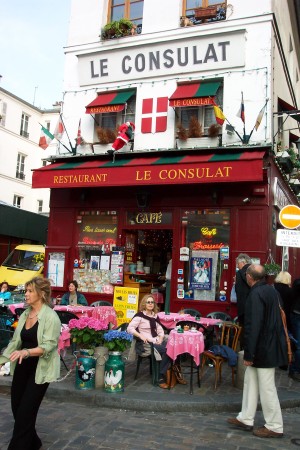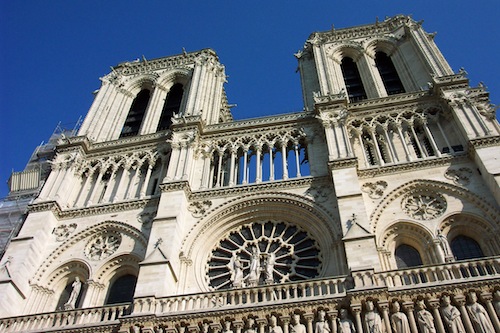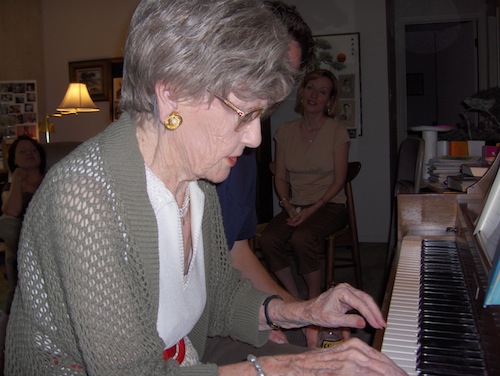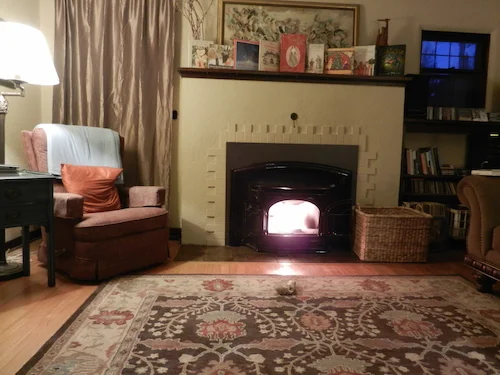April in Paris
My youngest son, a pianist and budding composer, is telling me a story about George Gershwin. While the brilliant American composer was living in Paris he sought out Maurice Ravel, the famed Impressionist Frenchman, to persuade him to take him on as a student. To which Ravel supposedly replied: Maybe I should take lessons from you, since you’re the one making all the money.
Luke has arrived to practice on our piano for his music history class, and to check out the leftovers in the fridge. He has his own apartment, of course, but we have better leftovers. This happens at least once a week. He’s in luck on both counts — a willing audience for his telling and his playing, plus a juicy chunk of roast pork loin with plums from last night’s supper. And a fresh pot of coffee as well. My mother, a fine pianist herself and a big fan of Gershwin, and someone who rarely turned down a cup of good coffee, would be a welcome guest to share this moment. But she died last spring, at age 90, after more than twelve years in the debilitating grip of Parkinson’s disease. And as Emily Dickinson wrote after her own mother’s death, we can only imagine her whereabouts. But I want to believe she’s listening in.

Seven years ago this April I was in Paris. My husband had been invited to an international trade show, and he wasn’t going to France without me, if he wished to remain married. It would be the first time in France for both of us. While he mingled with foreign engineers and businessmen at the massive convention center, I rode the famed Metro to the Musee D’Orsay and the Louvre, stunned by iconic beauty at every turn. We rented a tiny studio apartment at the base of Monte Martre, sipped creamy espressos, and savored apricot tarts and divine cheeses from shops along our street. We heard the nuns sing Vespers at Sacre Coeur during our first evening in town, speaking our English in low, soft voices. We tried to pretend we were Swedish or Dutch, anything but American. We made a three week adventure of it: a full week in the capitol city, followed by two weeks meandering the dreamy Southwest corner of France, where medieval villages from the days of Charlemagne crown distant hills and limestone houses bear pigioniers and painted shutters. My husband took hundreds of photos, while I wrote daily in a red leather journal with a silver pen.
My mother, born in 1920, spent her girlhood cocooned in the safe, rarified world of Scandinavian pietism, about as far from the high life of Paris in the 20s and 30s as one can get. Her father was an immigrant from Sweden who taught himself English, worked at various physical jobs, then went on to college and finally Bethel Seminary, the Baptist General Conference school in St. Paul, Minnesota, where my parents eventually met and married. My grandfather dreamed of medical school but ended up teaching psychology at Bethel College and pastoring numerous churches. Drinking, smoking, dancing, card-playing, and movies — the big five — were all taboo at Bethel. Listening to music meant hymns or classical works — never jazz. These strictures remained in place for decades.
My mother adored Daddy, as she called him, but she swooned for Ravel. Family legend has it that a recording of Ravel’s best known piece, Bolero, which somehow turned up in my mother’s possessions when in high school, was promptly destroyed, being deemed far too sensuous for the impressionable oldest daughter of a Swedish Baptist preacher. And she could painfully recall not being able to attend a friend’s birthday party as a child in Pasadena, because the planned activity for the group was to see a movie — a novel, rare treat in 1930. The first time I saw the film Babette’s Feast, I had some inkling of the dilemma my mother’s upbringing must have wrought in her blossoming creative life, as it would later in mine. I can vividly remember watching from the sidelines at ten years old while my friends practiced their arabesques in Camille Hamilton’s mother’s basement studio. I could observe but not take lessons. We couldn’t afford it, I was told. Probably true, though I always suspected the real reason was never mentioned — ballet might be high culture, but it was still dancing.
Yet in our house growing up, and there were many houses, music flowed like the Blue Danube Waltz, always playing somewhere. Usually on the local classical radio station, or from an album on our brand new stereo hi-fi: Ella Fitzgerald, Lena Horne, Duke Ellington, Errol Garner, all the jazz greats. My mother loved them all. She could sight-read quite well, but also had favorite pieces memorized, from Bach’s Two-Part Inventions to Count Basie. The most relaxing thing she would ever do was seat herself at the old upright in our Pennsylvania dining room, crammed against the wall and barely fitting the space, and let time fall away, the supper in the kitchen, the wet laundry in the basement. She tried her best to give us piano lessons, hoping that someone would carry on the tradition, but we weren’t compliant students, my stubborn siblings and me. Still, we appreciated what our mother could do on a keyboard. We may have been one of the last families to get a color TV, but we were baptized as infants with the glories of music, washed with treble and bass.

Woody Allen’s recent surprise hit, Midnight in Paris, reminds me of my mother’s internal struggle, because it’s all about art and desire and frustration. How each generation must make way for the next wave of creative sensibilities, pushing the borders of what is “acceptable” until the once novel becomes the new norm. It poses questions for those of us who attempt to live full, imaginative lives: what do we let go of our family history, what do we carry forward into our own artistry — be it poetry, painting, or piano? Why does nostalgia (from the Greek, the same root word as “pain”) create such longing in us for something past, something familiar but lost? I think my mother would have liked this movie. I know she would’ve loved to experience Paris. Her favorite perfume was Chanel No. 5. She was born a dreamer and romantic, and we are alike in this manner, despite her conservative religious heritage, despite the serious pitfalls of Romanticism.
April 6, 2012 — Good Friday this year — was the first anniversary of her death. Her physical body turned so frail and broken at the end of her life, her mind so contorted, one would never have wished for her to linger. Her synapses produced a jumble of nursing home chatter and conversations from decades long gone. She kept hearing a cacophony of music in her head and thought surely we could too. Her passing became a welcome relief, a merciful blessing. Yet to lose a mother rents a gaping wound in one’s life that no spouse, nor grandchild, nor friend, nor travel to a beautiful country can ever mend. Not a week goes by where I don’t hear a song on the car radio or public television that doesn’t remind me of her. I catch myself saying and doing things that shock me — oh, that’s something Mom would say!
Fortunately, someone has taken over her mantle. My son still arrives at the house to play our piano. Sometimes he practices his own fresh, engaging compositions. Or if he’s in the mood, classic stage and screen tunes from a battered green Reader’s Digest Songbook, tunes my mother knew well: “Ain’t Misbehavin,” “Night and Day,” “Begin the Beguine,” and one I almost cannot bear to hear, “Someone to Watch Over Me.” I like to think there’s a part of heaven where the streets look like Paris in the 20s and 30s, a romantic’s version of Paris. George Gershwin sits at a piano in a swanky club with velvet chairs and gaslight lamps. My beautiful mother wearing French silk waits at the rim of his admiring circle. She catches his eye, and he calls her up to join him for a duet. And so she rises, she rises.



















